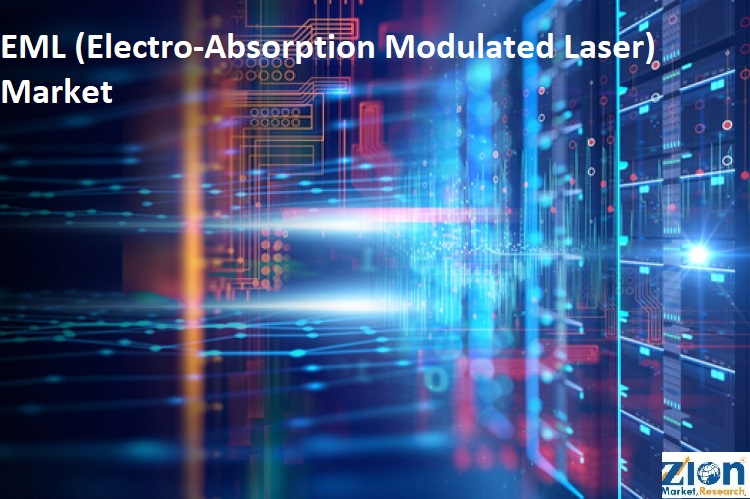EML (Electro-absorption Modulated Laser) Market Size
The global market for electro-absorption modulated lasers (EMLs) exhibited a commendable performance in 2022, reaching a substantial valuation of approximately USD 507.12 million.
Looking ahead, industry experts anticipate a robust growth trajectory for the EML market, projecting it to expand significantly and reach a staggering valuation of around USD 1220 million by the year 2030.
This impressive growth is expected to be driven by a compound annual growth rate (CAGR) of approximately 11.86% during the period spanning from 2023 to 2030.
These promising figures underscore the immense potential and increasing demand for EMLs in various sectors.
What is EML (electro-absorption modulated laser)?
Electro-Absorption Modulated Laser is what “EML” stands for in the industry. It is a cutting-edge semiconductor laser device that combines the functionalities of direct modulation lasers and external modulators in one convenient package.
Because of this one-of-a-kind combination, EMLs are able to vary the output power of the laser in an effective manner, which enables high-speed data transmission and precise control over the data stream.
The electro-absorption effect is what allows an EML to function properly; this process is something that happens naturally in certain semiconductor materials.
The application of an electric field to these materials causes a change in their absorption characteristics, which in turn causes a corresponding fluctuation in the intensity of the light that is emitted.
EMLs are able to fast and accurately adjust the laser output because they take advantage of the electro-absorption effect. As a result, they are ideally suited for use in applications that need high-speed data exchange.
Unraveling the EML Technology:
Electro-Absorption The development of modulated lasers is a significant step forward for the field of semiconductor laser technology.
These devices combine the characteristics of direct modulation with those of external modulators, making it possible to transmit data at high speeds while also allowing for wavelength tuning.
EMLs are essential components of current optical communication systems because they allow for exact control over data transmission.
This is made possible because EMLs modulate the output power of the laser in an efficient manner.
Driving Factors Behind the EML Market Boom:
Several key factors have fueled the exponential growth of the EML market:
- Soaring Data Traffic: An Unprecedented Increase in Data Traffic The growth of data-intensive applications, cloud computing, and streaming services has led to an increase in data traffic that is unprecedented. EMLs offer the essential speed and efficiency to handle this ever-increasing demand, and they do so by providing the necessary speed and efficiency.
- The 5G Revolution: EMLs have emerged as a vital technology to support the ultra-fast data transfer and low-latency requirements of next-generation wireless networks as the world transitions to 5G and beyond.
- Data Center Expansion: The Expansion of Data Centers The proliferation of data centers throughout the world calls for communication that is both dependable and lightning fast between servers and storage devices. EMLs provide a method that is both practical and economical for reaching this level of interconnection.
- Fiber Optic Communication: With the introduction of fiber-to-the-home (FTTH) networks and the continuous growth of high-capacity optical infrastructure, EMLs have become an essential component in the process of providing end consumers with high-speed internet connectivity.
Flourishing Applications of EML Technology:
Because of their adaptability, EMLs have found use in a wide variety of applications across the landscape of optical communication, including the following:
- Data Centers and High-Performance Computing: EMLs enable rapid data transmission within data centers, which supports efficient and smooth data communication. a. Data Centers and High-Performance Computing EMLs promote rapid data transfer within data centers.
- Metro and Long-Haul Networks: EMLs offer long-distance optical communication with minimal signal distortion, optimizing data transfer in metro and intercity networks. b. Metro and Long-Haul Networks EMLs enable long-distance optical communication with minimal signal distortion.
- Mobile Networks: EMLs offer the necessary speed and performance for mobile backhaul and fronthaul applications as the deployment of 5G gains momentum.
- Emerging Technologies: EMLs are clearing the way for revolutionary applications in sectors such as quantum communication and free-space optics thanks to their ability to pave the way.
Overcoming Challenges and Future Opportunities:
- Even though the EML market is thriving, there are significant issues that industry stakeholders are working diligently to address. These challenges are as follows:
- Decrease in Manufacturing Costs: The ongoing research and development activities are directed toward reducing the manufacturing costs of EML technology in order to make it more accessible to a wider variety of businesses.
- Thermal Management: Managing the temperature sensitivity of EMLs remains a priority to ensure their stability and longevity in demanding environments. This can be accomplished through thermal management.
- Integration and Standardization: Establishing common interfaces and standards for EMLs will enable smooth integration into existing optical communication infrastructures. This will be made possible by establishing common interfaces and standards.
Conclusion:
The market for electro-absorption-modulated lasers is in the midst of a period of unrivaled growth, which is having a significant impact on the prospects of optical communications across a variety of industries and countries.
The expansion of EML’s applications will be a driving force behind further developments in data transfer and worldwide communication as the technology continues to develop.
The EML market is positioned to play a vital role in altering the way we communicate and ushering in a new age of high-speed, reliable, and efficient optical networks as a result of ongoing advancements and collaboration among industry participants.
This will be accomplished by ushering in a new era of high-speed, optical networks. EMLs will surely continue to be at the vanguard of this disruptive journey for as long as businesses and consumers place a greater emphasis on the transfer of data without any interruptions.

